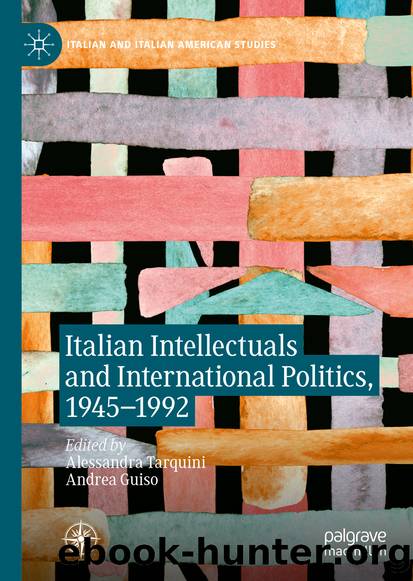Italian Intellectuals and International Politics, 1945–1992 by Unknown

Author:Unknown
Language: eng
Format: epub
ISBN: 9783030249380
Publisher: Springer International Publishing
For the United States and especially for Henry Kissinger , 1973 represented the “Year of Europe”. On the contrary, for Del Noce, 1973 was the year of Europe’s suicide, of its death. A death in which, according to Del Noce, the United States had certainly shared.20
7.4 Détente as “Moral Finlandization”: On the Responsibility of the Soviet Union (1974–1978)
Del Noce’s negative and pessimistic approach to the détente process reached its climax between 1975 and 1978 during the third and final phase of his reflections on the topic. According to Del Noce, this phase marked the apex of the effects of détente, following the success of the preceding months. Such radicalization of Del Noce’s view of détente was related to the evolution of his thought and especially to the discovery of Eurocommunism, a worrying new phenomenon that would come to occupy much of his attention in those years.
Various elements of Del Noce’s previous positions remained unvaried in his new understanding of the détente process. Still in the second half of the 1970s Del Noce directed his criticism regarding the “meaning” of détente at the United States and “progressive western culture” in general. In particular he was criticizing the presumption that their politics of détente was nothing more than a Western attack aimed at “defeating communism on the plane of ‘modernity’”—as he described it in the 1975 article “Two Meanings of Détente”21—and at reaching an “ideal unity between two models, two systems, two civilizations, and world concepts”. The effects, repercussions and “dangers” of a “misinterpreted détente”, of the “modernization moralism (moralismo della modernizzazione)” typical of Western “democratic progressivism” were different from and “much worse” than any effects that could have been caused by “the most cynical of political realisms”: the “choice of Sade over Kant” (i.e. the choice of “libertine Enlightenment over rationalist religious Enlightenment”); the possibility of a “third war”. Most importantly it caused a dangerous and powerful counterattack on the part of the Soviets. During the second half of the 1970s, this was the factor that worried Del Noce the most. While during the period between 1970 and 1973 Del Noce mostly blamed the West (and first of all the United States) for having misconstrued the détente process and the subsequent crisis that followed in Europe, in the period between 1974 and 1978 he turned his criticism to the Soviets (together with their loyal agents in the West). Del Noce considered Eurocommunism the main “instrument of Russia’s politics of expansion” into the Old Continent. Del Noce openly disagreed with those in the Western world who considered Eurocommunism a positive “outcome” of détente. For those people Eurocommunism represented a “victory of democracy”,22 while Del Noce saw a close connection between Eurocommunism and a Soviet “Imperialist” vision of détente. According to him, that connection was mortal for Europe, whose murder/suicide was becoming progressively more evident, under the deadly conditions of its moral Finlandization.
Such a conclusion was drawn from a specific interpretation of Eurocommunism elaborated by Del Noce.23 Understood as a synonym of Gramscism,
Download
This site does not store any files on its server. We only index and link to content provided by other sites. Please contact the content providers to delete copyright contents if any and email us, we'll remove relevant links or contents immediately.
Fanny Burney by Claire Harman(25820)
Empire of the Sikhs by Patwant Singh(22222)
Out of India by Michael Foss(16341)
Leonardo da Vinci by Walter Isaacson(11967)
Small Great Things by Jodi Picoult(6138)
The Six Wives Of Henry VIII (WOMEN IN HISTORY) by Fraser Antonia(4825)
The Wind in My Hair by Masih Alinejad(4454)
The Lonely City by Olivia Laing(4152)
The Crown by Robert Lacey(4139)
A Higher Loyalty: Truth, Lies, and Leadership by James Comey(4073)
The Iron Duke by The Iron Duke(3676)
Millionaire: The Philanderer, Gambler, and Duelist Who Invented Modern Finance by Janet Gleeson(3612)
Sticky Fingers by Joe Hagan(3474)
Alive: The Story of the Andes Survivors by Piers Paul Read(3346)
Papillon (English) by Henri Charrière(3319)
Joan of Arc by Mary Gordon(3294)
Stalin by Stephen Kotkin(3117)
Aleister Crowley: The Biography by Tobias Churton(3051)
Ants Among Elephants by Sujatha Gidla(2945)
